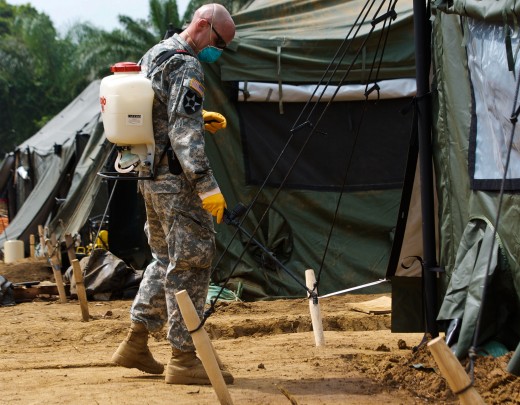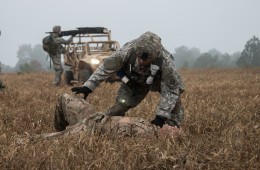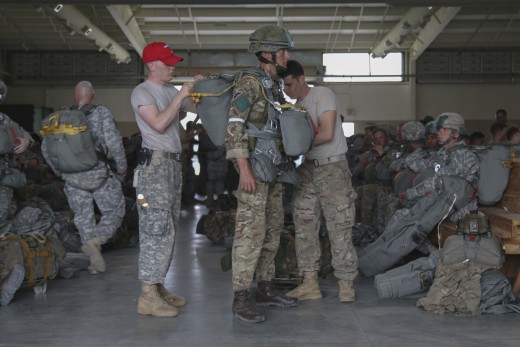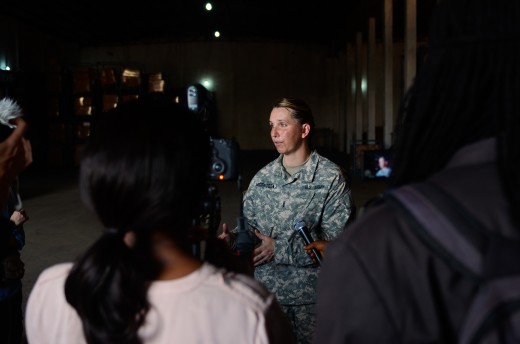
Preventative medicine soldier sprays insecticide around living quarters in Gbediah, Liberia, Dec. 15, 2014. Taken during Operation United Assistance, the joint effort to combat the devastating Ebola outbreak. | Source
Hollywood has produced a multitude of cinematic experiences that have shown the absolute horrors of war. They captivate us through the brave warriors who charge into battle; serving up extra helpings of freedom and butt kicking around the world. Whether they're Cpt. Miller searching for Pvt. Ryan during WWII (Saving Private Ryan, 1998), or Dutch hunting down an alien killing machine, a predator so to speak, in the jungle (Predator, 1987).

A medical soldier treating casualties in training scenario, 2016. | Source
But there's also an emotional connection, brothers and sisters in arms ready to pay the ultimate price. It's a mixed cocktail of heroism, and "the feels".
These movies are easy to sell, they're exciting and have a vast audience base. Regardless of fiction vs. non-fiction, we're still invested, and in some ways relate what we see on screen to real military personnel. Although those values may be shared with real heroes, there's still a story behind the curtain.
Those who don't choose direct combat roles are sent to Advanced Individual Training (AIT). This is where they become experts in the jobs of their choosing. Their new profession may not be the basis for a new action movie, but still equally as important as those on the front line. Here's a few that are less commonly known in the army.
Veterinary Food Inspection Specialist, 68R
If you're like myself, you probably read this job title and thought, "Finally! A profession for warriors with an unwavering passion for inspecting animal food." I'll let both of our thought processes down easy. We're not wrong, but not completely right either. Initially it was created for animal surgeons who also had knowledge of food safety, but now primarily focuses on human food. George Washington was actually the first to understand the importance of having a soldier with those qualities on the battlefield. Massive numbers of troops fell victim to inadequate food quality in the wars following the first president's realization. The real turning point for the issue occurred during the Spanish American War. The Army directly caused the death of thousands by improperly handling beef. Outraged, the country demanded a solution for possible mishaps in the future. In 1916, the War Department (Department of the Army) activated the Veterinary Corps. A completely separate specialty was also later developed for the care of animals. 68T, Animal Care Specialist.
Parachute Rigger, 92R
Have you ever messed up? Made a minor error that your boss jumped all over? It's natural as humans. Soldiers are not exempt, and sometimes that miscalculation could mean life or death. Parachute Riggers are constantly reminded of this grim fact. They assist the Army by preparing and packing the parachutes for soldiers in airborne units, who are known as paratroopers. They rely on the expertise and precision of parachute riggers when they jump out of a perfectly good airplane. Multiple forms of redundancy go into the half-hour or more time frame while packing. This includes a reserve chute, and a 16 point inspection by senior leaders before completion. Considered by some to be a thankless job, but rewarding after every successful jump.

Railway Operations Crew Member, 88U
If you long for the days of traveling by train and defending it against bandits on horseback, Uncle Sam has a job for you. Not exactly, But there is no official regulation against a healthy imagination every now and again. Joking aside, this job does exist in the Army Reserve for those who have an extreme love of country and locomotives. Their daily duties range from operating, supervising and serving as crew members on diesel-electric locomotives. These troops transport military equipment and repair railways throughout this great nation that they defend. Who could refuse fulfilling a child hood dream while providing service to the country?
Public Affairs Specialist, 46Q/R
"You think you're Mickey Spillane?" - Gunnery Sergeant Hartman's response to Private Joker's decision to become a military journalist in Full Metal Jacket, 1987. The army identifies two different careers in this field. 46Q photography/print writer, and 46R, video broadcaster. While they both specialize as journalists, the major differences between the two is how they capture the news. Photographers are proficient with still photography, editing photos in various digital programs and news writing. Broadcasters shoot and edit video, construct comprehensive on-air interviews, DJ for radio stations and act as military correspondents. They're given the rare opportunity to observe all aspects of the military and create a lasting impression through their work.

Source
Competitive Athlete
Be all you can be, a slogan used by the army. The opportunities that they provide would definitely make you a well-rounded professional in a variety of fields. Here's an interesting one that's offered to every member and all career fields, athlete. All Army Sports is a program where soldiers compete in numerous sports against other branches, the best of the best. Although they may not be competing against the elite athletes from around the world, the time spent on the team is recognized as professional. It would give validity to an aspiring athlete's resume. There's a tryout process every year in sports such as basketball, golf, rugby, soccer, volleyball, wrestling and taekwondo. The skill level requirements for each sport typically resemble those of a professional/amateur. Soldiers who think they're up to par, request permission from their commander. Those who are selected, participate in competitions that are usually televised.
There's So Many More
Even though they're not highlighted very often, their roles are necessary for the army to function properly. Every member is considered a silent professional, and wouldn't ask for it any way.

No comments:
Post a Comment
Note: Only a member of this blog may post a comment.